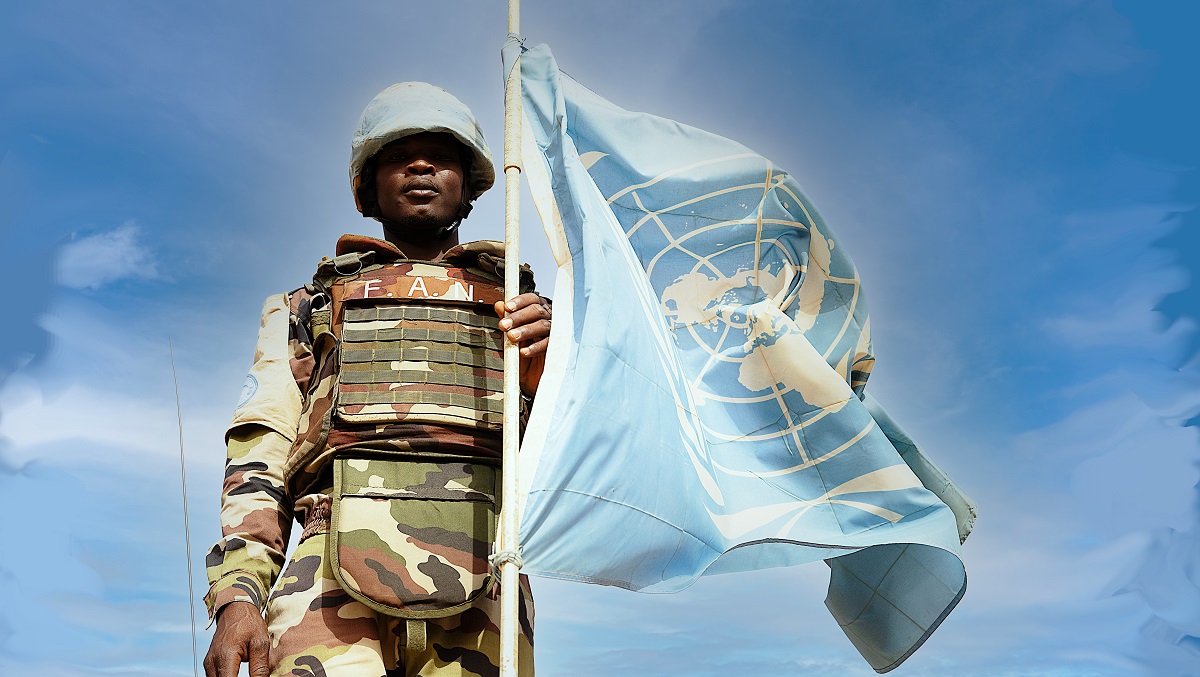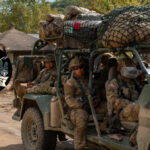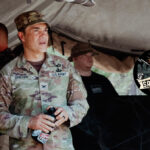
The United Nations Multidimensional Integrated Stabilization Mission in Mali (MINUSMA) was established on April 25, 2013 to stabilize the country after the Tuareg rebellion of 2012. In June 2023, a new government that had come to power in a coup withdrew the mandate, forcing the mission and all of its staff to depart the country by the end of the year. Joe Ruzicka served as the Senior Advisor to the Commanding General, as well as the Senior U.S. Military Observer to MINUSMA, during that turbulent time. He is in the studio with guest hosts Jonny Drake and TJ Moffatt to discuss his experiences in Mali and why the mission ended. It’s the first of a two-part episode that examines the pros and cons of how the UN mission in Mali was conducted.
In 23 years of service I never thought that I would end up as a senior officer advising a UN peacekeeping mission in the country of Mali.
Podcast: Download
Joe Ruzicka currently serves as the Chief of Current Operations for United States Army South. He is a colonel and an Armor Officer who has served in various command and staff positions to include the Senior Advisor to the Commanding General, UN Mission, Mali (MINUSMA) as well as the Senior U.S. Military Observer to MINUSMA.
Jonny Drake is a former artilleryman, a current Foreign Area Officer and a colonel in the U.S. Army. He has served in various operational and strategic assignments across Europe, the Middle East, Central Asia, and Eurasia. He is currently the Chief of Peace Operations Division at the Peacekeeping and Stability Operations Institute.
TJ Moffatt is currently the Deputy Director of the U.S. Army Peacekeeping and Stability Operations Institute (PKSOI). He is a retired colonel who served as both an Infantry Officer and 48C, European Foreign Area Officer in the U.S. Army. With extensive security cooperation experience, he has worked to build partner capacity in many allied and partner countries in eastern Europe and Africa. His last assignments in the Army include Commander, U.S. Military Advisory Group and Director of European Studies/Deputy Dean at the U.S. Army War College.
The views expressed in this presentation are those of the speakers and do not necessarily reflect those of the U.S. Army War College, U.S. Army, Department of Defense or the United Nations.
Photo Description: Blue helmets from the Nigerien contingent of MINUSMA provide security during the arrival of the delegation of the Special Representative of the UN Secretary-General in Mali, El-Ghassim WANE in Ménaka to meet local authorities, internally displaced persons and humanitarian actors.
Photo Credit: MINUSMA/Harandane Dicko





The title of this podcast is “Searching for Peace in Timbuktu: The UN Mission in Mali Part I.”
But, in consideration of S.P. Huntington’s quoted item immediately below, should we say that something like “modernity” — and/or “development” — actually, may be what the UN (and the governments the UN supports) is seeking to achieve in places like Timbuktu?:
“The apparent relationship between poverty and backwardness, on the one hand, and instability and violence, on the other, is a spurious one. It is not the absence of modernity but the efforts to achieve it which produce political disorder. If poor countries appear to be unstable, it is not because they are poor, but because they are trying to become rich. A purely traditional society would be ignorant, poor, and stable.” (See Page 41 of S. P. Huntington’s famous “Political Order in Changing Societies.”)
As a general matter — and as the central underlying problem that the UN and the governments that they support face — in seeking to achieve “modernity” and/or “development” in places like Mali today — consider the following, which is also from S. P. Huntington. (Herein, give special attention the final sentence of this quoted item.):
” … Mexican leaders are engaged in the great task of redefining Mexican identity and have introduced fundamental economic reforms that eventually will lead to fundamental political change. In 1991 a top adviser to President Carlos Salinas de Gortari described at length to me all the changes the Salinas government was making. When he finished, I remarked: ‘That’s most impressive. It seems to me that basically you want to change Mexico from a Latin American country into a North American country.’ He looked at me with surprise and exclaimed: ‘Exactly! That’s precisely what we are trying to do, but of course we could never say so publicly.’” As his remark indicates, in Mexico as in Turkey, significant elements in society resist the redefinition of their country’s identity. … ” (See S. P. Huntington’s equally famous “Clash of Civilizations;” therein, look to the section entitled “Torn Countries.”)
Question — Based on the Above:
If such — conflict producing/stability preventing — things as “seeking modernity,” “seeking development” and “seeking the redefinition of a country’s identity” are actually what the UN (and the governments the UN supports) look to achieve in places such as Mali today,
And if, accordingly, significant elements of Malian society have decided to fight back — so as to resist and prevent this such unwanted “modernization,” this such unwanted “development” and this such unwanted “redefinition of their country’s identity” (sound like something we may be seeing here in the U.S./the West today also ?????) —
Then should not everyone — today and going forward — address UN (etc.) “peacekeeping;” this, in these much more understandable — and these much more accurate — “seeking modernity”/”seeking development”/”seeking the redefinition of various countries’ identities” terms? (That is, terms which help us to better understand — not just what the UN and the host governments are actually trying to achieve — but also help us to better understand who, accordingly, stands in the UN, and the governments that the UN supports, way and why?)
Based on the information that I provide above, could we say that the reason that the UN was recently fired in Mali, and the Wagner Group recently hired there, this was because the host government came to believe that the less-restrained/unrestrained Wagner Group could — possibly — do a better and quicker job of (a) dealing with those significant elements of Malian society that were (b) resisting modernity, resisting development and resisting the redefinition of Malian society accordingly?
Addendum and Question:
Addendum:
To see how the UN peacekeeping missions seem to have morphed in the UN “development,” UN “modernization” and UN “redefinition of the identity of outlying states and societies” missions post-the Old Cold War, see, for example, the Oxford Development Studies (Volume 49, 2021 – Issue 3) article “Developing Peace: The Evolution of Development Goals and Activities in United Nations Peacekeeping,” by John Gledhill, Richard Caplan and Maline Meiske.
Question:
Can we really call the political, economic, social and/or value model that Russia/the Wagner Group seem to be selling — and that the current Malian (and other) governments seem to be buying — as “modern,” “development,” etc.; this, given that this such model does not seem to have significant democracy, human rights and/or free market economy components?